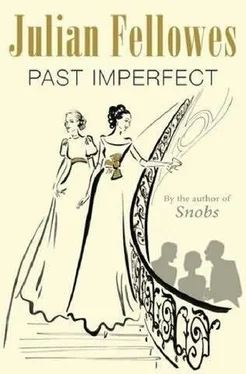‘Why did you “take him along?” Why have you become his promoter? ’
‘I don’t think I knew that I had.’
She looked at me with a rather pitying smile.
Probably it was a half-subconscious desire to bury my lie to Georgina by making it true that prompted me to organise a group for dinner as the party began to thin out, and later that evening about eight of us were climbing down the treacherous basement stairs of Haddy’s, then a popular spot on a corner of the Old Brompton Road, where one could dine after a fashion as well as dance the night away, and all for about thirty shillings a head. We often used to spend whole evenings there, eating, talking, dancing, although it is hard to imagine what the modern equivalent of this sort of place might be, since to manage all three in a single location seems impossible now, given the ferocious, really savage, volume that music is played at today anywhere one might be expected to dance. I suppose it must have begun to get louder in the discotheques after I had ceased to go to them, but I was not aware of the new fashion until perfectly normal people in their forties and fifties adopted it and started to give parties that must rank among the worst in history. Often I hear the notion of the nightclub, where you sat and chatted while the music played, spoken of as belonging to the generation before mine, men and women in evening clothes sitting around the Mirabelle in the 1930s and ’40s, dancing to Snake Hips Johnson and his orchestra while they sipped White Ladies, but like so many truisms this is not true. The opportunity to eat, talk and dance was available to us and I enjoyed it.
Haddy’s did not really qualify as a nightclub. It was more for people who couldn’t afford to go to proper nightclubs. These places, Haddy’s, Angelique’s, the Garrison, forgotten names now but full every night then, provided a simple service, but as with all successful innovations they filled a need. The dinner would belong to the recently arrived style of paysanne cooking, but this predictable repast would be combined with the comparatively new invention of dancing, publicly, not to a band but to records, presided over by some sort of disc jockey, a job description then only in its infancy. The wine was rarely more than plonk, certainly when we young ones were paying, but the bonus was that the owners did not expect to sell the table much more than once throughout the evening. Having eaten, we sat drinking and banging on about what preoccupied our adolescent troubled minds into the small hours, night after night, without, as far as I remember, the smallest problem with the management. They cannot really have been businessmen, I’m afraid. No wonder their establishments did not stand the test of time.
That particular evening, for some strange reason, Serena Gresham had joined us among the rest, tagging along when I told her where we were going. I was surprised because usually she would listen politely to the plan, make a little moue of regret with her mouth and wish aloud she could have come. But this time she thought for a moment and said ‘all right. Why not?’ It may not seem a very enthusiastic response, but at the sound of her words songbirds rose in flight in my heart. Lucy was there, trying and failing to escape Philip, her nemesis, who had proposed himself after her car had left. Damian came, of course, and a new girl, whom I had not met before that evening, a ravishing, Hollywood-style blonde with little to say for herself, Joanna Langley. I say I did not know her, but I had heard of her as being very rich, one of the richest girls of the year, if part of the new post-Presentation crop. Her father had founded a sales catalogue for casual clothing or something similar, and while the money ensured that no one was rude to her face, things were not quite so pleasant behind her back. Personally, I liked her from the start. She was sitting on my left.
‘Are you enjoying it?’ she asked as I sloshed some wine into her glass.
I wasn’t sure if she meant the dinner or the Season, but I assumed the latter. ‘I think so. I haven’t done much yet, but it seems a nice crowd.’
‘Are you?’ This came from Damian, further down the table. I could see he was already training his headlamp glare on to Joanna. Like me, he clearly knew who she was.
She was a little startled, but she nodded. ‘So far. What about you?’
He laughed. ‘Oh, I’m not part of it. Ask him.’ He indicated me with a jocular flick of his chin.
‘You’re here, aren’t you?’ I replied rather crisply. ‘What other qualification do you think we have?’ Which was dishonest, but I didn’t worry much, as I knew nothing would dampen his ardour.
‘Don’t let him mislead you.’ Damian had brought his gaze back to Joanna. ‘I’m a perfectly ordinary boy from a perfectly ordinary home. I thought it would be fun to see it for myself, but I’m not part of this world at all.’ It was carefully measured, like everything he said, and I can understand now what it was intended to achieve. It meant that every girl at that table would at once feel protective of him and none of them, or their friends, would ever be allowed to accuse him of pretending to be something he was not. His apparent modesty would give him permission to take and take, but never to feel any responsibility to a world he had declared he did not belong to and to which he owed nothing. Above all, it washed over their defences. From then on they were not afraid of being used by such a man. How could they be when he said himself he had no ambition? We had not even ordered before he was writing down his address for Joanna and two of the other girls present.
I note I have stated that Damian was ‘of course’ with us. Why was it so understood that he would be? At this early stage of his London career? Perhaps because I had begun to reckon his gifts. I looked down the table to where he sat, with Serena on one side and Lucy on the other, making them both listen and laugh but never overplaying his hand with either, and I understood then that he was one of those rare beings who can fit seamlessly into a new group until, before much time has passed, they seem to be an integral, a founder, member of it. He joked and ribbed, but frowned a little, too. He took them seriously and nodded with concern, like someone who knew them well, but not too well. In all the time I knew him, he never made the classic parvenu mistake of lapsing into over-familiarity. Not long ago I was talking to a man before a shoot. We had got on well at dinner the night before and he, supposing, I imagine, that we were now friends, began to poke me jocularly in the stomach as he joshed me about my weight. He smiled as he said it and looked into my eyes, but what he saw there cannot have encouraged him as I had decided, on that instant, I would never seek his company again. Damian made no such error. His approach was relaxed and easy but never egregious or impertinent. In short, it was carefully thought out and well delivered, and that evening gave me one of my first opportunities to witness the skill with which he would land his quarry.
The dinner was finished, the girls’ uneaten stew had been carried away, the lights had been lowered a few degrees and couples around the room were beginning to take to the floor. Nobody from our group had ventured forth yet, but we were nearly there and, during a slight lull in the conversation, I heard Damian turn to Serena. ‘Do you want to dance?’ he suggested, almost in the tone of a shared joke, a funny secret only fully understood by the two of them. It was beautifully done. They were playing some record we all liked, was it Flowers in the Rain? I forget now. At any rate, after a fractional pause she nodded and they stood. But next came the wonder. As they passed by my end of the table I heard him remark quite casually: ‘I feel such a fool. I know you’re called Serena and I remember where we first met, but I never got your surname. If I leave it much longer it’ll be too late to ask.’ Like a conman or a courtier he waited, just for a second, to see if his ploy would work. Did he breathe more easily when she gave no indication that she knew what he was up to?
Читать дальше












